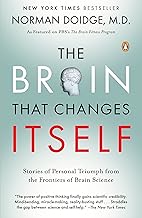
Why We Sleep: Unlocking the Power of Sleep and Dreams
Matthew Walker, Steve West, et al.
4.7 on Amazon
19 HN comments

Thinking, Fast and Slow
Daniel Kahneman, Patrick Egan, et al.
4.6 on Amazon
16 HN comments

The Design of Everyday Things: Revised and Expanded Edition
Don Norman
4.6 on Amazon
15 HN comments

The Body Keeps the Score: Brain, Mind, and Body in the Healing of Trauma
Bessel van der Kolk M.D.
4.8 on Amazon
9 HN comments

The Black Swan: Second Edition: The Impact of the Highly Improbable: With a new section: "On Robustness and Fragility" (Incerto)
Nassim Nicholas Nicholas Taleb
4.5 on Amazon
8 HN comments

The Righteous Mind: Why Good People Are Divided by Politics and Religion
Jonathan Haidt and Gildan Media, LLC
4.6 on Amazon
8 HN comments

The War of Art: Break Through the Blocks and Win Your Inner Creative Battles
Steven Pressfield and Shawn Coyne
4.6 on Amazon
5 HN comments

How to Change Your Mind: What the New Science of Psychedelics Teaches Us About Consciousness, Dying, Addiction, Depression, and Transcendence
Michael Pollan and Penguin Audio
4.7 on Amazon
4 HN comments

The Brain That Changes Itself: Stories of Personal Triumph from the Frontiers of Brain Science
Norman Doidge
4.7 on Amazon
4 HN comments

The Tipping Point: How Little Things Can Make a Big Difference
Malcolm Gladwell and Hachette Audio
4.4 on Amazon
4 HN comments

Maps of Meaning
Jordan B. Peterson and Random House Audio
4.8 on Amazon
3 HN comments

Man's Search for Meaning
Viktor E. Frankl , William J. Winslade, et al.
4.7 on Amazon
3 HN comments

How Emotions Are Made: The Secret Life of the Brain
Lisa Feldman Barrett, Cassandra Campbell, et al.
4.6 on Amazon
3 HN comments

Humankind: A Hopeful History
Rutger Bregman , Erica Moore, et al.
4.7 on Amazon
3 HN comments

Emperor of All Maladies: A Biography of Cancer
Siddhartha Mukherjee
4.8 on Amazon
3 HN comments
Wonnk13onJuly 4, 2021
I think I might finally have the motivation to read his earlier book How to Change Your Mind
sharadovonJuly 4, 2021
Most books which talk about drugs are written by overzealous, hippy types who claim to have seen the light. This was the first time that a serious yet entertaining author like Pollan reported on a controversial subject. I particularly liked his gonzo form of reporting.
petemironApr 16, 2021
PragmaticPulponJuly 11, 2021
It’s strange that Pollan would turn around and try to shift blame rather than simply staying quiet. What does he think he stands to gain by throwing his former publisher, who went to great lengths to support him, under the bus? Why not simply let it stay in the past? Or admit the truth and give credit where credit is due?
I have to say, the more of Pollan’s work I read the less I enjoy his writings. He seems intent on riding the current waves of pro-drug and anti-enforcement sentiment to propel his own notoriety as an author. This also manifests as very one-sided portrayals of drug use that glorify and exaggerate the benefits while downplaying the negatives. In his book “How to Change Your Mind” I felt that every pro-psychedelic argument was presented with little questioning, while he only offered easy strawman counter arguments as skepticism, easily dismissed by the reader after reading a few more chapters of his pro-psychedelic writings.
“How to Change Your Mind” was very popular several years ago and continues to circulate in certain circles. I’ve read many anecdotes of people who sought psychedelics after reading his book with the expectation of life-changing experiences or psychedelic treatments for their conditions, only to be disappointed when they didn’t experience the miraculous experiences and transformations he describes.
I wish we had a more engaging alternative writer to reference about the realities of psychedelics and other drugs. Someone who was more interested in delivering realistic, albeit necessarily less boring, descriptions of the realities of this space. Some of the depictions of psychedelics as miracle cure-all medicines have gotten out of control and have become completely detached from the actual research, which puts a heavy emphasis on many (10-20 or more) therapy sessions surrounding the guided and monitored psychedelic administration. These books tend to downplay the realities and instead glorify the romantic notion of mushrooms as a forbidden, mystical cure for all ailments. The realities are much less clear-cut and definitely not always as positive as they sound in these modern psychedelic mysticism books.